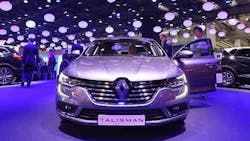Late Arrival: Renault Has Mountain to Climb in China
WUHAN, China—With China’s growth slowing, ruthless competition and virtually no brand recognition, French carmaker Renault is banking on SUVs and a Transformers actress as it confronts an uphill struggle to break into the world’s biggest car market.
Europe’s third largest carmaker acknowledged it was coming late to the party when it opened its first factory in China this week--years after Toyota and General Motors.
“It’s a tricky situation for Renault,” Jia Xinguang, chief analyst at China Automotive Industry Consulting, told AFP. “About five or six years ago, the Chinese market was very lively but conditions are worse and the competition is cutthroat.
“Another thing is that the Renault brand isn’t well-known.”
Having shifted only 15,000 vehicles in China last year--a tiny fraction of the 24 million that hit the roads--the company knows it has its work cut out for it to become a household name.
“There might be a lack of awareness. The Chinese may have heard people talking about it (Renault), but they don’t know anything about it, there aren’t that many of them on the road and they don’t know anyone in their circle who drives one,” said Jacques Daniel, CEO of its $1.2 billion joint venture with Chinese manufacturer Dongfeng.
Renault’s involvement with Formula 1 races in Shanghai has helped increase brand recognition in China, although pronunciation of the company name in Mandarin is “Lei nuo."
With so many roadblocks ahead of it, Renault is pinning its hopes on two things: the Chinese thirst for SUVs, one of the fastest growing sectors in the auto market, and the pulling power of a Chinese megastar.
'Copied and Pasted'
The SUV sector has experienced explosive growth in China, expanding by around 53% last year to account for almost a third of the auto market.
“We’re arriving late but with the right product,” says Daniel.
The right product, according to Renault, is a SUV called the Kadjar that goes on sale in the country next month -- which will initially be the factory’s sole product.
Renault officials say their existing partnership with Japan’s Nissan will help with production speed and costs as the factory has been “copied and pasted” from Nissan plants, using similar equipment and machinery, and the Kadjar itself is based on Nissan’s Qashqai, enabling the two firms to share the same suppliers.
“It’s easier to build your brand by showcasing one product to begin with, then two. Imported vehicles are not that competitive and your influence is very limited,” says Renault CEO Carlos Ghosn -- who also heads Nissan.
The French firm has also beefed its showroom network, and intends to offer a broader range once Chinese sales increase.
But China’s auto market, although vast, is suffering.
Total sales rose 4.7% in 2015--7% for passenger cars--but the growth was markedly lower than for previous years.
Model Ambassador
Most of all the automaker wants to rev up its China sales with the help of a Chinese megastar actress and fashion symbol.
Fan Bingbing has only had minor roles in Hollywood films, such as X-Men: Days of Future Past, Transformers: Age of Extinction, and the mainland-only version of Iron Man 3, but she is a huge star in China.
As such she has become go-to Chinese celebrity ambassador for foreign firms seeking a stronger foothold in the world’s second-largest economy, and has represented Louis Vuitton, Cartier and rival car firm Mercedes-Benz.
Fan earned $21 million in 2015, according to Forbes magazine, putting her ahead of US actresses Jennifer Aniston and Angelina Jolie.
In November she became a spokeswoman for the Kadjar, unveiling a red-and-black SUV to the Chinese public at the Guangzhou motor show.
But winning hearts and minds--and wallets--will take time. Renault has an ambitious goal to corner 3.5% of the Chinese market, but says little about when that might happen.
“Building a factory in China isn’t that complicated,” says Renault-Dongfeng vice-president Hu Xindong. “But it’s harder gaining the trust of consumers and making them fall in love with your brand.”
Copyright Agence France-Presse, 2016
About the Author
Agence France-Presse
Copyright Agence France-Presse, 2002-2025. AFP text, photos, graphics and logos shall not be reproduced, published, broadcast, rewritten for broadcast or publication or redistributed directly or indirectly in any medium. AFP shall not be held liable for any delays, inaccuracies, errors or omissions in any AFP content, or for any actions taken in consequence.
